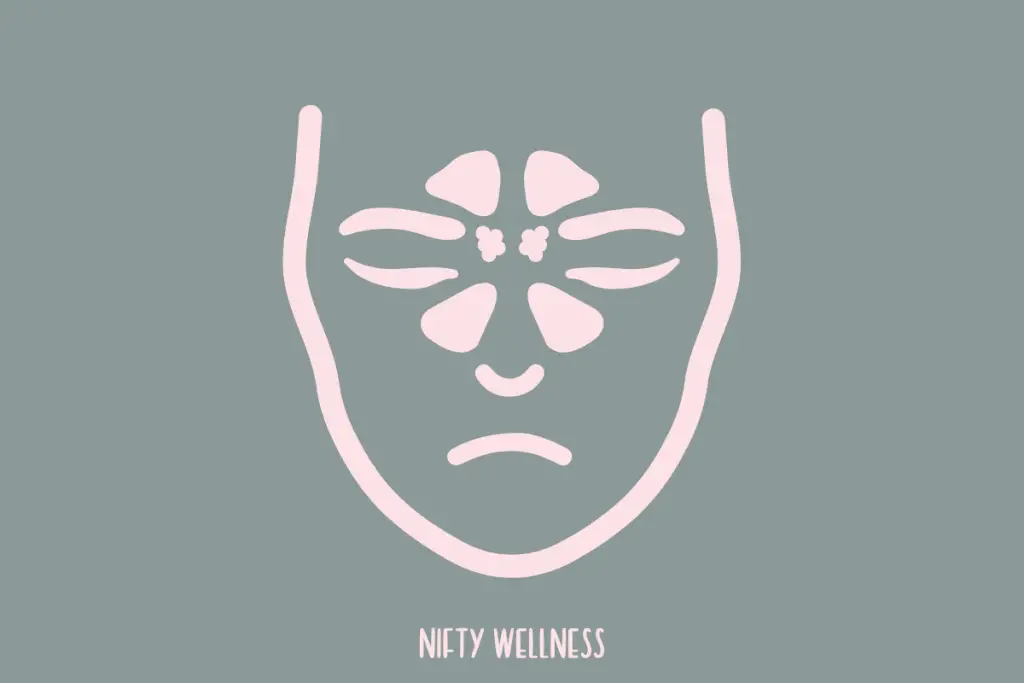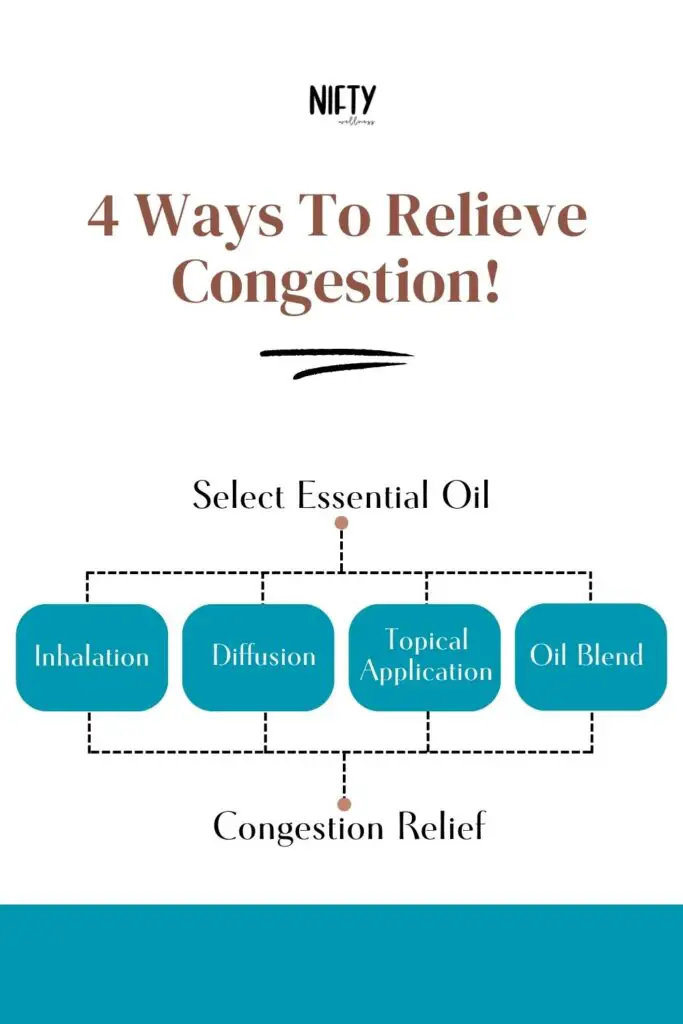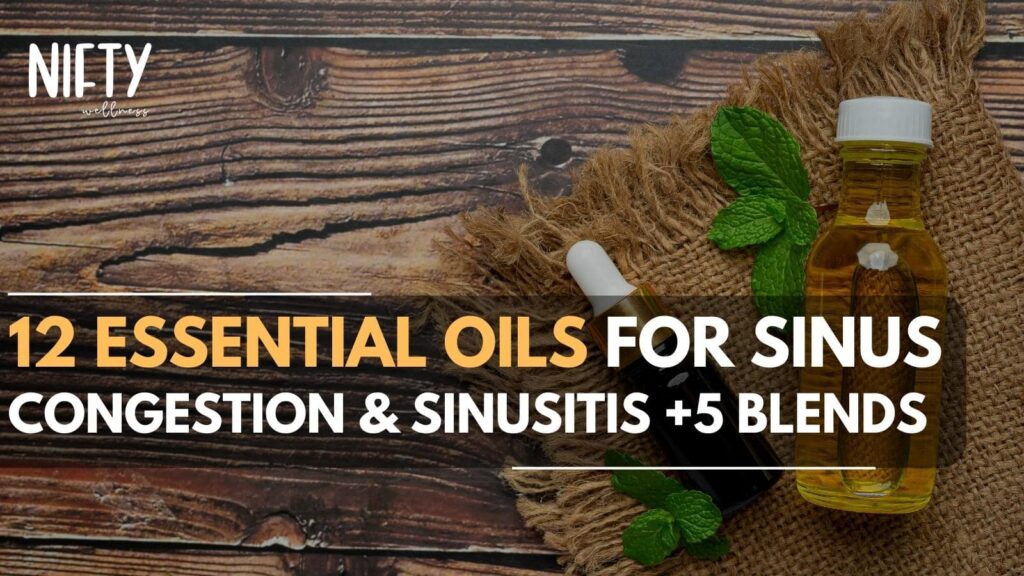Are you looking for natural remedies to relieve sinus congestion and sinusitis symptoms? Do you want to know what essential oils are used to clear sinuses? You have come to the right place! Essential oils for sinus pressure might be your answer. These concentrated plant extracts or oils for sinus infection have been used for centuries to alleviate sinus pressure, clear congestion, and provide relief from sinus infections. In this comprehensive guide, we’ll explore 12 essential oils for sinusitis and what essential oil is good for sinuses. Plus, we’ll delve into five beneficial essential oil blends that combine these aromatic wonders for enhanced relief. Let’s discover the soothing power of essential oil for sinus pressure, essential oils for sinus congestion, and sinusitis, providing natural solutions for your discomfort.
What Are Sinuses?


The sinuses are a connected system of hollow cavities in the skull and bones around the nose.
Fun fact: The word “Sinus” derives from the Latin word sinus, which means a bay, curve, or hollow cavity.
Together, these sinuses are referred to as paranasal sinuses, but they exist separately as well. The four pairs of sinuses correspond with the bones they are located in:
Maxillary sinuses: The maxillary sinuses are found on each side of the nose, behind the cheekbones, and near the maxillae or upper jaws. These are the largest of the four sinuses.
They play a vital role in various aspects of our overall health.
Frontal sinuses: The frontal sinuses are located on the front of the face in the center of the forehead or front bone, just above the eyes. Understanding their role is crucial for managing sinus health effectively.
Ethmoid sinuses: The ethmoid sinuses are three small pairs of cavities found in the ethmoid bone. They lay on each side of the bridge of the nose, near your eyes. The ethmoid sinuses are a collective group of six to twelve air cells that open independently into the nasal cavity.
Sphenoid sinuses: The sphenoid sinuses are found deeper in the skull within the sphenoid bone, behind the eyes near the optic nerve and pituitary gland. Their location and functions make them an essential part of our sinus system and overall health, underscoring the importance of understanding their role in sinus health.
Sinuses play several critical functions in the nose and respiratory system, allowing the air you breathe in from your nose and mouth to move through the sinus passages and into the lungs and other parts of the body.
The sinuses also give your voice resonance through air vibration, protect the face from damage in the case of trauma, insulate against rapid temperature change in the nose, and provide an immunological defense against pathogens.
What Is Congestion?

Nasal congestion (often accompanied by sinus pressure) is that “stuffed-up” feeling you get when you have a cold or allergies.
Congestion occurs where the membranes lining your nasal passages become inflamed and irritated, causing more mucus to build up and block your airways.
This fluid builds up and becomes trapped in the sinuses, causing them to feel blocked and painful.
Mucus flows through our sinuses and drains into the nose, along with air. Typically the mucus from the sinuses drains into the nasal passages and down the throat.
This function keeps your nose moist and filters out dust and bacteria. Thus providing moisture back into the naval passages can relieve congestion and mucus build-up.
Are Essential Oils Good For Sinuses And Congestion?


Essential oils are a great, natural treatment that people can use to relieve sinus congestion, promote sinus drainage, and unblock a stuffy nose.
These oils have been used for centuries as natural remedies to support overall health and wellness.
In particular, menthol-based essential oils such as peppermint and eucalyptus have shown substantial promise in providing relief for those with sinus congestion.
Essential oils can relieve the uncomfortable and painful pressure associated with congestion and are a safe, natural alternative to synthetic medications. Several studies have found essential oils and their compounds to possess analgesic or pain-relieving qualities.
Essential oils can help treat sinus congestion caused by allergies, inflammation, viral infections like the common cold, and bacteria by relieving symptoms of congestion and inflammation.
Their effects on the airways and clearing congestion can help you breathe easier and even relieve other symptoms such as cough and head pressure.
Read our latest blog “The Ultimate Guide To Oils For After Shaving: Achieve a Smooth and Nourished Skin” and say goodbye to razor burns and irritation as these are the essential oils for after shaving that will revolutionize your grooming routine.
Best Essential Oils for Easing Sinus Congestion

Easing sinus congestion can be a breath of fresh air, and essential oils are natural remedies known for their effectiveness. Among the best essential oils for addressing sinus congestion are eucalyptus, peppermint, tea tree, and lavender. Eucalyptus oil boasts decongestant properties, helping to open airways and provide relief. Peppermint oil’s cooling sensation can soothe sinus discomfort, while tea tree oil offers its antiseptic benefits. Lavender oil, with its calming aroma, can alleviate tension and contribute to a more relaxed breathing experience. When seeking relief from sinus congestion, these essential oils can be your aromatic allies.
Peppermint Essential Oil
Minty, menthol-based essential oils such as peppermint effectively provide relief from sinus congestion and pressure.
Peppermint’s high concentration of menthol makes it a successful decongestant that cools and opens the sinus cavities.
Peppermint essential oil is also antibacterial and antiviral, helping kill bacteria and viruses that cause a sinus infection.
Rosemary Essential Oil
Rosemary is a powerful antiseptic and antibacterial oil known to stimulate lymphatic drainage and provide the body with antioxidants.
According to a 2016 study, rosemary was found to have strong anti-inflammatory effects which could ease the pain and swelling of nasal congestion.
Eucalyptus Essential Oil

Like peppermint, eucalyptus oil is cooling, calming and can help open airways and slow down any excess mucus production.
A compound found in eucalyptus oil called eucalyptol is known to be anti-inflammatory, dilate blood vessels to increase oxygen delivery, provide a cooling sensation, treat coughs and sore throat, and can help those with congestion fall asleep easier.
(Check out the best essential oils for sleep.)
Inhalation is the best method when using eucalyptus oil for congestion. This can be done through diffusion or steam inhalation.
Lemon Essential Oil
Lemon essential oil boosts the immune system with its high vitamin C concentrations and protects the body from infection with its antiviral and antibacterial properties.
It is also known to break down thick, built-up mucus, relieving nasal congestion. This oil can be diffused into the air or added to a steamy bath or shower.
Lavender Essential Oil
This calming essential oil may improve sinus congestion by reducing pain, swelling, and sinus pressure. One 2015 study found lavender essential oil useful in treating acute inflammation.
While more research is needed on lavender oil’s potential effects in treating sinus congestion, diffusing lavender oil at night can likely break up phlegm and help those with congestion fall asleep easier.
Clove Bud Essential Oil
The warm, comforting scent of clove essential oil can help ease feelings of congestion while purifying the air.
It is also anti-inflammatory, antimicrobial, and antiviral—all of which can protect against the development of sinusitis.
Oregano Essential Oil
According to research, oregano essential oil contains a compound known as Carvacrol. Carvacrol is shown to have intense antimicrobial activity and can potentially stop bacteria from growing.
Thus using oregano essential oil can help treat nasal congestion by fending off harmful bacteria and preventing infection.
How To Use Essential Oils for Congestion


Using essential oils for congestion can provide much-needed relief. A popular method is steam inhalation, where you add a few drops of your chosen essential oil to a bowl of hot water, cover your head with a towel, and inhale the steam. This helps clear nasal passages. You can also dilute essential oils with a carrier oil and apply the mixture to your chest or throat, allowing the aroma to ease congestion. Aromatherapy diffusers are another convenient option, dispersing the oils throughout the room for continuous relief. These methods make essential oils a versatile and effective choice for congestion management.
Inhalation
The most effective way to use essential oils for easing sinus congestion is through inhalation.
One way to do this is through direct inhalation or breathing in the essential oil’s aroma straight from the bottle.
You can also add a few drops of oil to a cotton ball or handkerchief and hold it up to your nose to breathe it in directly.
Another way to benefit from essential oils is to use steam inhalation or diffuse them throughout the air. Diffusers are considered a less powerful inhalation method because the oils are diluted with water and spread throughout the air.
However, they are still an effective method as they add beneficial moisture into the air and can be done multiple times a day.
If you are using a diffuser, a typical rule of thumb is to use five to fifteen drops of an oil or oil blend at a time.
On the other hand, steam inhalation can be done by combining a few drops of essential oils into hot water.
The rising steam will contain the therapeutic oils and provide instant relief when you breathe the steam in through your nose. This method should be done for no more than two minutes at a time.
Topical
Topical application is also an option for those struggling with congestion.
Mix a few drops of essential oil with a carrier oil of your choice to create a salve. You can massage this salve into the chest and back to provide relief and open your airways.
Essential Oils For Treating Sinusitis

Essential oils can be an extremely powerful, natural treatment for sinus infections. These oils can be diffused into the air, added into a steamy shower or bath, and even applied topically to provide relief.
Tea Tree Essential Oil
Tea tree oil or Melaleuca alternifolia is a natural antiseptic whose antimicrobial and antibacterial properties make it a suburb oil for eliminating the infection-causing germs from the sinuses, preventing any further infection.
It has been used for centuries worldwide to treat bacteria-caused ailments, and because bacteria or viruses cause sinus infections, tea tree oil can help treat the problem at its root cause.
Tea tree oil is especially powerful when combined with steam as it can help open the sinuses, loosen thick mucus, and ease congestion.
Peppermint Essential Oil
Peppermint essential oil is an excellent oil for those dealing with chronic sinusitis since it is safe for long-term use.
It also provides relief from pain and inflammation, kills germs, opens the sinus cavities, and eases other sinusitis symptoms such as cough and sinus headaches.
Pine Essential Oil
Pine essential oil is a fantastic oil for treating sinusitis as it is antibacterial, antiseptic, and anti-inflammatory.
Its aroma and anti-inflammatory properties can calm and soothe the respiratory system while also working to kill the source of the infection.
Diffusing pine essential oil can also help disinfect and eliminate the dust and bacteria causing the sinus infection.
Pine oil can also be diluted in a carrier oil such as jojoba or grapeseed oil and applied to painful or tender areas as its ability to stimulate blood flow in these areas can decrease tenderness and swelling.
Rosemary Essential Oil
In addition to its antibacterial and anti-inflammatory benefits, rosemary essential oil can stimulate the respiratory system and soothe sinusitis symptoms such as hoarseness in the throat and chest.
This oil can be diffused into the air or mixed with carrier oils and rubbed on the chest to provide relief.
Clary Sage Essential Oil
Clary sage essential oil is naturally antimicrobial and can help treat sinusitis caused by bacteria as it eliminates and prevents the spread of harmful bacteria.
It can also aid with easing pain, inflammation and providing circulation. This oil can also help those with congestion and sinusitis to feel less irritable as it promotes feelings of calm and clarity.
Seeking the ideal scent? Check out our latest blog Fragrance Oils vs Essential Oils: Which One is Right for You? Make your surroundings more aromatic, and your life more pleasant.
What Is Sinusitis & How To Identify It?


Sinusitis is the most common sinus problem that occurs from an infection in the upper respiratory tract that spreads into the sinuses, causing pain and inflammation.
Sinusitis, sometimes called rhinosinusitis, is often developed after someone has had a common cold.
When mucus thickens and begins to build up, the sinuses cannot drain properly, allowing bacteria and viruses to build up in the mucus. It is most often the maxillary sinuses that become infected with sinusitis.
Sinusitis is often referred to as a sinus infection, with symptoms including:

- Pain or pressure in areas of the face where sinuses are located.
- Thick, sticky mucus in the nose that may be cloudy or yellowish-green in color.
- Stuffy nose.
- Tender face, specifically around the eyes.
- Decreased sense of smell and taste.
- Hoarseness in the throat and chest.
A sinus infection can last anywhere from ten days to 8 weeks. Some people experience chronic sinusitis, which occurs more than four times a year and can last longer than eight weeks.
Best Essential Oil Blends For Sinuses

Finding suitable essential oil blends for sinus relief can be a game-changer. One effective blend includes eucalyptus, peppermint, and lavender oils. Eucalyptus provides powerful decongestant properties, while peppermint and lavender offer soothing effects. For a different approach, try a blend with tea tree, lemon, and frankincense oils. Tea tree oil is renowned for its antibacterial properties, lemon adds a refreshing twist, and frankincense helps reduce inflammation. These thoughtfully crafted blends harness the therapeutic benefits of essential oils, making them a valuable addition to your sinus relief arsenal.
Lemon, Peppermint & Eucalyptus
Lemon, peppermint, and eucalyptus essential oils can be combined to calm and treat inflamed and irritated sinuses.
The blended scent is uplifting and can be diffused into the air to provide relief for sinus congestion and other associated symptoms such as cough and head pressure.
This essential oil blend can also be combined with carrier oils and applied to the chest to help open up the airways and ease symptoms of cough, sore throat, and hoarseness.
Lavender, Clove Bud & Clary Sage
This essential oil blend can promote feelings of relief while easing symptoms of congestion. This blend is antibacterial and anti-inflammatory, which is beneficial in both preventing and treating sinus infections.
To diffuse into the air, combine one drop of clove, six drops of lavender, and three drops of clary sage.
Pine, Eucalyptus & Rosemary
For those dealing with nasal congestion, diffusing a blend of pine, eucalyptus, and rosemary essential oils can help clear your passages and promote better breathing.
For this aromatic blend, you will want to combine four drops of pine, three drops of eucalyptus, and three drops of rosemary.
Clary Sage & Lavender
Those dealing with sinusitis or extreme congestion may find sleeping difficult.
A blend of six drops of clary sage to four drops of lavender is a great combination to diffuse into your bedroom at night as it can promote feelings of relaxation and lessen restlessness.
Peppermint, Eucalyptus, Tea Tree, and Pine
This blend of peppermint, eucalyptus, tea tree, and pine essential oils specifically targets mucus build-up and the pains associated with congestion and sinus pressure.
To diffuse this antimicrobial blend, mix four drops of peppermint, four drops of eucalyptus, six drops of tea tree, and three drops of pine.
Conclusion
In conclusion, essential oils offer a natural and effective remedy for dealing with sinus congestion and sinusitis. Their therapeutic properties provide relief from the discomfort caused by inflamed nasal passages and blocked sinuses. Whether you prefer the cooling sensation of peppermint, the soothing effects of lavender, or the antibacterial strength of tea tree oil, essential oils can help ease symptoms and promote overall sinus health. Additionally, blending these oils provides diverse and complementary benefits, making it easier to find the perfect solution to address your sinus-related concerns. Now that you know what essential oils are good for sinuses, embrace the aromatic wonders of essential oils and experience the relief they bring to sinus congestion and sinusitis, providing fresh air and a sense of well-being.
Frequently Asked Questions

How Do You Clear Your Sinuses?
There are several simple and effective at-home treatments you can do to clear your sinuses and relieve sinus pressure.
First, you will want to keep your nasal passages moist as dry air can dry out your nasal membranes and cause further irritation. You can do this by:
- Use a humidifier or diffuser to put moisture into the air.
- Drink lots of water and other hydrating fluids. This will thin out the mucus and help you breathe more clearly.
- Use a nasal irrigator, bulb syringe, or neti pot with ultra-clean, distilled water to flush out your passageways.
- To relieve temporary discomfort and open up your nasal passages, place a warm wet towel over your face and nose for several minutes.
- Breath in steam. You can heat a bowl of hot water or run a hot shower to create steam. Breathing in the steam will moisten the mucous membranes and temporarily relieve sinus congestion.
How Can I Clear My Sinuses In The Shower?
Running a hot shower that produces steam can help relieve congestion and help the sinuses unblock.
You can also place several drops of essential oils, such as eucalyptus, into your shower. The steam will diffuse the oil into the air and help you breathe more easily.
How Can I Keep My Sinuses Healthy?
There are several simple steps you can take to keep you and your sinuses healthy, avoiding infections:
- Clean your hands often.
- Maintain moisture in the nose and sinuses, using a humidifier or diffuser in the winter.
- Drink water and other hydrating fluids to keep your mucus thin and flowing.
- Clean your house regularly by dusting and vacuuming.
Are Essential Oils Safe For Babies With Congestion?
According to the American Association of Naturopathic Physicians, you should not use essential oils with babies who are younger than three months.
It is also believed that some essential oils such as eucalyptus and peppermint can trigger asthma-like symptoms and may be dangerous for children under three years old.
Always consult with a doctor before using essential oils with babies and young children.
Can I Put Essential Oils In My Nose?
It is generally recommended not to directly put essential oils onto your skin as they are highly concentrated. However, you can directly inhale essential oils from their bottles or through diffusion and steam inhalation.
When you whiff an essential oil, its aroma and benefits will immediately begin to target congestion in the nose, providing relief.
How Long Does It Take To Clear A Blocked Nose?
Nasal congestion can affect people differently, especially if you are dealing with acute or chronic sinusitis. Generally, nasal congestion will last around five to ten days.
Is Menthol A Decongestant?
Yes, menthol is a natural decongestant. Menthol is a natural plant extract that has been used for hundreds of years to treat respiratory diseases, improve airflow, and relieve nasal congestion.
Menthol helps clear mucus out of the nose and chest, providing significant relief for those struggling with congestion.
You can find menthol naturally in peppermint essential oil, and it is also often added to medicinal cough drops and decongesting chest rubs.
How Can I Get Immediate Relief From Nasal Congestion?
There are several things you can do to experience immediate relief from nasal congestion.
First, you will want to keep and use a humidifier in your home.
A humidifier will add much-needed moisture into the air that can reduce sinus pain and relieve a stuffy nose.
You can also use steam and essential oil diffusion to alleviate feelings of pain, swelling, congestion, and inflammation.
Drinking plenty of water and pressing a warm towel to your nose for a few minutes can also provide relief from nasal congestion by encouraging mucus to loosen up.
What Is Nasal Congestion A Sign Of?
Nasal congestion or a stuffy nose can be a result of allergies or a common cold. However, more severe and long-term nasal congestion could be a sign of a sinus infection.
How Do I Stop Nasal Congestion At Night?
You can use essential oils and diffusion to stop nasal congestion at night. Using a humidifier or an essential oil diffuser will bring moisture into the air and prevent your nasal passages from getting more inflamed and irritated.
Certain essential oils like peppermint, eucalyptus, lavender, and clary sage can provide additional recourse by killing and preventing bacteria, encouraging airways to open, reducing inflammation, and relieving sinus pain and pressure.
You can also use an essential oil chest rub to help decongest, and elevating your head will prohibit mucus from building up in the sinuses and clogging your nasal passages.
What Are the Best Essential Oils For Nasal Congestion?
To relieve nasal congestion with essential oils, you will want to use oils like peppermint, eucalyptus, rosemary, oregano, clary sage, lavender, and tea tree.
You can also target specific areas of concern such as pain, inflammation, or mucus with particular oils.
Analgesic oils like eucalyptus, peppermint, rosemary, and tea tree can be used to target pain and pressure. Thick mucus build-up can be targeted with oils like eucalyptus, peppermint, rosemary, pine, and tea tree.
Inflammation associated with nasal congestion can be calmed with oils like clove bud, eucalyptus, lavender, peppermint, pine, and tea tree.
To target the direct cause of sinusitis, antimicrobial, antiviral, and antibacterial oils like tea tree, oregano, lemon, and lavender are especially useful.
How Do You Use Tea Tree Oil For A Sinus Infection?
Due to its potent antiseptic properties, tea tree oil is an effective essential oil that kills bacteria and viruses that cause sinus infections. It is also analgesic, anti-inflammatory, and can help break down thick mucus.
To use tea tree essential oil for treating a sinus infection, place two to three drops into a bowl of hot, steamy water.
Prevent the heat from escaping by placing a towel over the bowl and your head. Breathe in this aroma for a few minutes to decongest.
You can also place a few drops of tea tree oil into a steamy shower or an essential oil diffuser.
What Essential Oils Are Good for Sinus Headaches?
Sinus headaches are caused by the build-up of pressure in the sinuses and can be relieved by using several essential oils:
- Peppermint essential oil is one of the best oils for soothing sinus headaches due to its concentration of menthol, which eases pain and promotes muscle relaxation.
- Rosemary essential oil is also effective in treating sinus headaches due to its pain-relieving and anti-inflammatory properties. It is also shown to reduce stress and increase circulation.
- Eucalyptus essential oil, similar to minty peppermint, can ease sinus tension and headaches by relaxing the muscles, opening the nasal passages, and clearing the sinuses.
